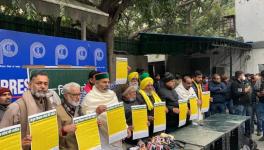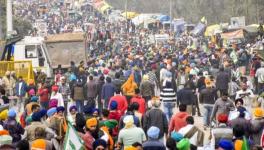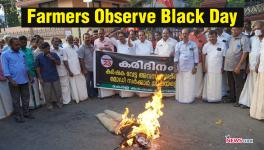Affected by Land Acquisition, Gujarat Farmers Support Anti-Farm Law Protests
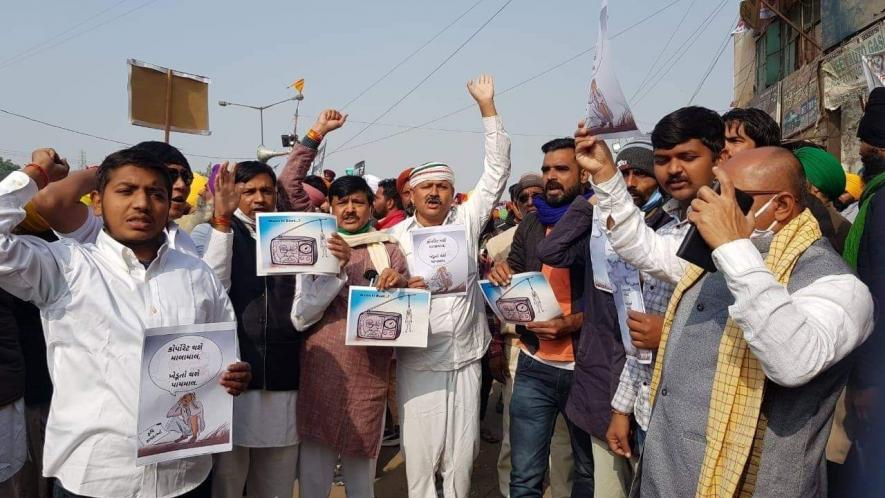
Bharat Bhill, a farmer from Talaja taluka of Bhavnagar in Gujarat, was informed by his friends on the evening of December 7 that the police were looking to detain him. This was not the first time Bhill would be detained, however, this time it was not for participating in a protest but for posting messages on social media and WhatsApp in support of the ongoing protest against the new farm laws near Delhi.
“I was not at home so I wasn’t detained. Later I got to know the police had been placing farmers under home arrest across the state for supporting the ongoing protest,” Bharat Bhill told NewsClick.
“I cannot physically join the protest as I have to attend court hearings every day at Talaja sessions court,” he added.
Bhill is one of many farmers of the 13 villages of Talaja and Mahuva taluka of Bhavnagar district who have been fighting against land acquisition by Ultra Tech Cement in their area.
“About 1,500 hectare of land in the 13 villages have been leased for 50 years to Ultra Tech Cement for mining limestone despite 95% of the farmers not wanting to sell or lease their land,” tells Bhill who had led the movement against the land grab.
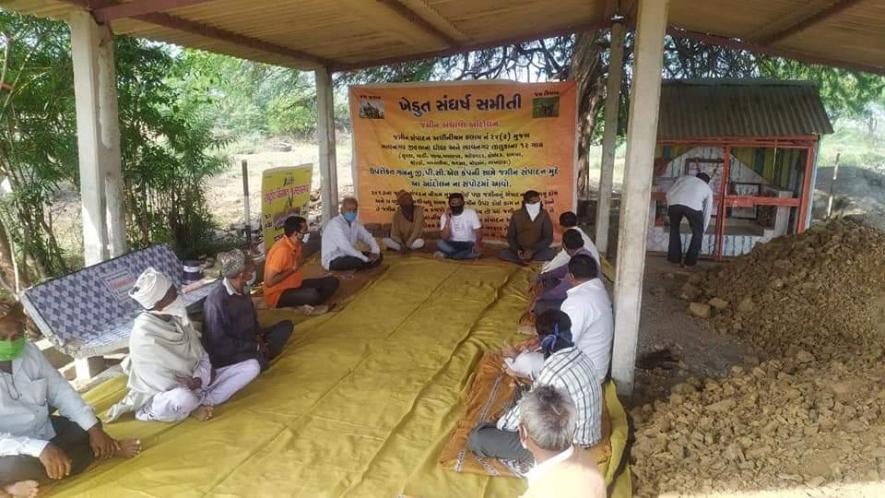
Bill has had multiple charges slapped against him in the past two years along with 115 other farmers who had protested.
In January 2018, Ultra Tech Cement, a company of Aditya Birla Group got the environmental clearance to mine for limestone in 13 villages of Mahuva and Talaja taluka. In a letter, Union Ministry of Environment stated that the permission comes with certain conditions. In accordance with the letter, Ultra Tech Cement has to rehabilitate 147 families and provide a house for each family with total expenditure of Rs 12.25 crore as per guidelines of Right to Fair Compensation and Transparency in Land Acquisition, Rehabilitation and Resettlement Act 2013.
“Fifteen hundred hectares of fertile agrarian land and about 200 hectares of gauchar and government waste land is under risk due to mining. About 150 hectares were purchased by the company 20 years ago but not acquired in all these years, rest 1250 hectares of land has been given on lease to the company without consent of farmers,” says Kanubhai Kalsariya, a former BJP MP from Mahuva constituency turned activist.
In Ghogha, another taluka of Bhavnagar, farmers have a similar tale to tell. Between 1993 and 1994, 3,377 acres of land was acquired by the then Bharatiya Janata Party-led Gujarat government from 12 villages of Ghogha taluka. The land was acquired to establish a thermal power plant, a colony, mine lignite and have an area for ash dumping. In 1997, consent was taken from villagers but no attempts were made to take possession of the land until December 2017.
As farmers of the Ghogha taluka began to protest by various means, government used brute force and imposed Section 144 in the area barring assembly of more than three people at a time. Despite sitting on dharna, facing police lathi charge and tear gas, an array of cases against them and challenging the land acquisition at Gujarat High Court, mining began on the land under police protection.
“I had 35 bigha of land that was acquired as the mining began. Last year I could not farm as we were busy in the protests against the land acquisition. This year I have leased 20 bigha of land in Kareda, a neighbouring village to farm,” Vasudev Gohil, a farmer from Ghogha taluka told NewsClick.
“Yesterday we (farmers) sat in protest, but this time not against acquisition of our land but in support of the ongoing protest in North India. We were not granted permission citing the pandemic. Despite that, one or two farmers each representing about 12 or 13 villages sat as a mark of support till the police made us leave,” added Gohil.
Around 250 kilometres away in Jamnagar, another group of farmers have been fighting against Reliance. About 60 farmers have held their land inside cordoned area of Reliance Industries that acquired about 10,000 acres of land from 17 villages between 2006 and 2008.
Mehulbhai Khetia, a protesting farmer from Kanachikari village, said he lost his land to Reliance Industries. “We received the first notice in the year 2006 that stated that land from Kanachikari and other surrounding villages were to be sold to Reliance Industries. We were offered Rs 16 to Rs 20 per square metre for jirayat (non-irrigated) and bagayat (irrigated) land respectively. The price offered to us was barely equal to our earning of a year,” he said.
Reportedly, while the Gujarat government was offering meagre prices to farmers for their land, government waste land adjacent to farmers’ land was sold to Reliance at Rs 384 per square metre and gauchar land was sold at an added 30% cost of the wasteland.
In a similar pattern, agrarian land is said to be acquired for bullet train project in South and Central Gujarat at meagre rates. Out of nearly 6,900 farmers who will be affected by the project, about 60% of them have protested against the process of the land acquisition.
The farmers represented by advocate Anand Yagnik filed petitions in the Gujarat High Court challenging the acquisition. However, in September 2019, the court dismissed petitions that had demanded four times the prevailing market rate as compensation for the land. Following which, the protesting farmers filed 50 Special Leave Application (SLP) in the Supreme Court in December 2019.
National High Speed Rail Corporation (NHRCL) is said to acquire 1396.3 hectares of land for the massive project of which 955.9 hectares is in Gujarat. Authorities of NHRCL claim that 82.17% of land acquisition is complete so far in Gujarat where farmers and landowners have been paid compensation. However, the compensation is paid only on paper and not reached the farmers, say farmers rights activists.
Amid their own land struggle, many of the farmers have extended support to the protest against the new farm law in North India. Khedut Samaj, a farmers’ rights organisation that was instrumental in fighting against the land grab for bullet train, declared their support for the protest in early December this year.
“Our representatives in different districts had submitted a memorandum to respective district authorities condemning use of brute force like tear gas and water canon on protesting farmers and seeking to end it. We had decided if no response is given by December 3, we will also march to Delhi,” said Jayesh Patel, President of Khedut Samaj.
Noticeably, an umbrella organisation called Gujarat Kisan Sangharsh Samiti was formed with participation of about 23 farmers rights organisations from across the state. After the umbrella organisation declared its support for the Bharat Bandh called by farmers protesting in North India, Gujarat government enforced Section 144 across the state barring assembly of more than three people.
While the Chief Minister called the protest a mere result of instigation by the opposition, the Gujarat Director General of Police held a press conference stating anybody protesting or posting on social media about the protest or any turmoil will be arrested.
Thereafter, farmers leaders were put under house arrest from the evening of December 10. However, defying all odds and avoiding arrest, about 150 farmers disguised themselves to reach Delhi Jaipur highway to join the protest.
Get the latest reports & analysis with people's perspective on Protests, movements & deep analytical videos, discussions of the current affairs in your Telegram app. Subscribe to NewsClick's Telegram channel & get Real-Time updates on stories, as they get published on our website.










